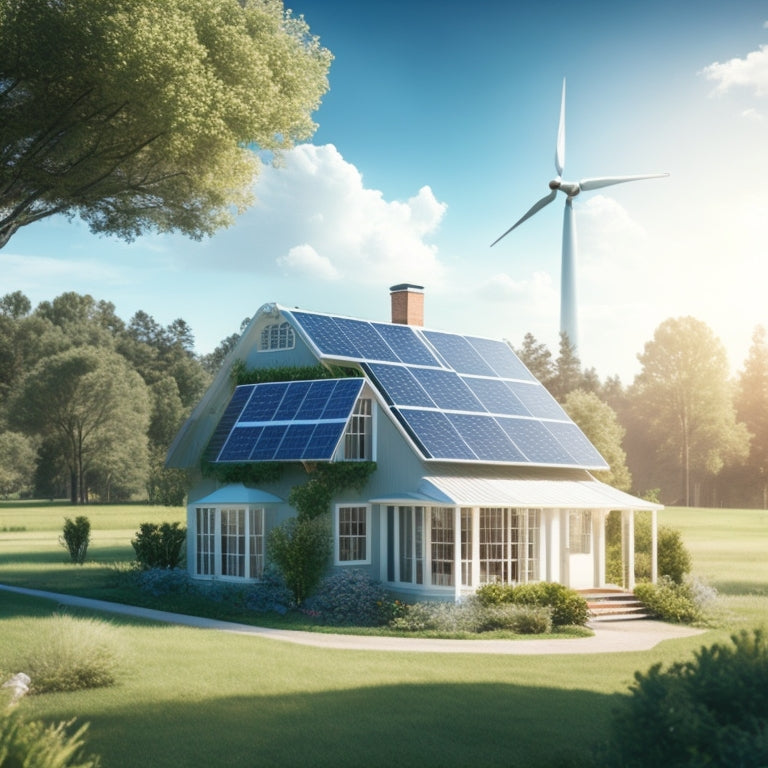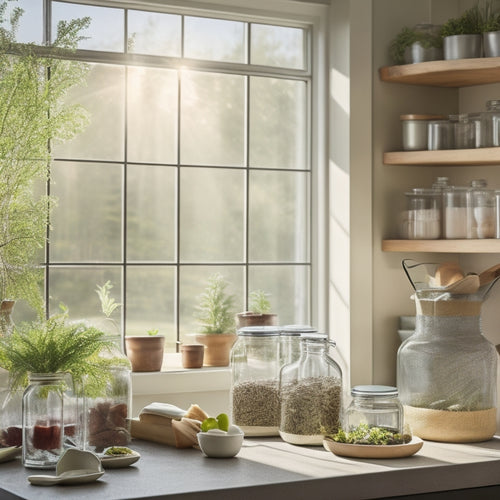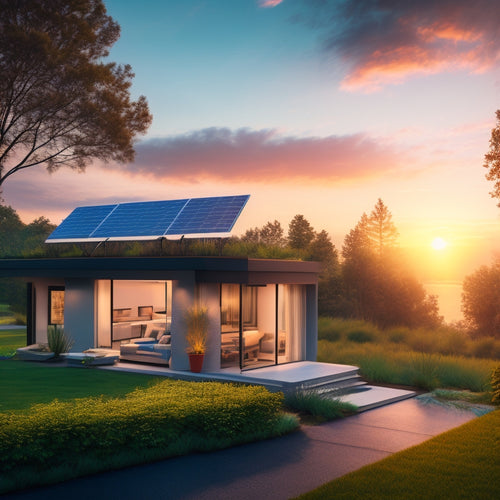
Why Renewable Energy Cools Your Home
Share
You can utilize the power of renewable energy to cool your home, reducing your reliance on the grid and slashing your energy bills by up to 50% while minimizing your carbon footprint. Solar panels capture thermal energy for eco-friendly cooling solutions, integrating passive cooling strategies for sustainable systems. By choosing solar energy, you'll reduce your energy consumption and carbon footprint, increasing energy independence and property value. You'll also improve indoor air quality and promote a healthier environment. Additionally, you'll uncover more ways to optimize your energy usage and learn how to maximize the benefits of renewable energy for a more sustainable future ahead.
Key Takeaways
- Renewable energy cools your home by harnessing solar power for eco-friendly cooling solutions, reducing reliance on the grid and carbon footprint.
- Solar cooling systems can reduce energy consumption by up to 50%, leading to significant cost savings and increased energy independence.
- Integrating passive cooling strategies and energy-efficient appliances enhances indoor air quality, reduces mechanical cooling needs, and promotes a healthier environment.
- Renewable energy alternatives like geothermal cooling, green roofs, and heat pumps provide sustainable solutions, reducing environmental impact and energy consumption.
- Advanced materials and smart home automation in radiant cooling systems optimize cooling performance and energy usage, making renewable energy a more effective option.
Harnessing Solar Power for Cooling
As the sun beats down on your roof, it's generating more than just heat - it's producing a potential source of energy that can be employed to cool your home. By installing solar panels, you can capture this thermal energy to power photovoltaic systems that provide eco-friendly solutions for cooling.
This approach enables you to achieve energy independence, reducing your reliance on the grid and promoting climate resilience. Furthermore, passive cooling strategies can be integrated with solar power to create a sustainable cooling system.
Additionally, high-efficiency solar charging solutions advanced MPPT technology can maximize energy harvest, ensuring a reliable power supply. By taking advantage of solar energy, you can reduce your carbon footprint and contribute to grid sustainability, all while keeping your home cool and comfortable.
Reducing Energy Consumption at Home
You can considerably reduce your energy consumption at home by using efficient appliances, such as LED bulbs and Energy Star-rated refrigerators, which consume less power while providing the same functionality.
In addition, adopting energy-saving habits, like turning off lights and electronics when not in use, can make a substantial difference.
By investing in Energy Efficient Smart Thermostats, you can automate temperature control and optimize energy usage based on your schedule.
Moreover, implementing these strategies, you'll not only lower your energy bills but also contribute to a more sustainable future.
Efficient Home Appliances
By the time summer rolls around, your home appliances are likely working overtime to keep you cool. To reduce energy consumption, consider upgrading to energy-efficient appliances that employ smart technology. These devices can learn your cooling habits and adjust their performance accordingly.
| Appliance | Energy Efficiency Feature |
|---|---|
| Air Conditioner | Inverter technology for ideal cooling |
| Refrigerator | Smart sensors to enhance cooling cycles |
| Ceiling Fan | Energy-efficient motor with adjustable speed |
Energy Saving Habits
During the sweltering summer months, adopting energy-saving habits becomes essential to reduce your home's energy consumption. You can start by developing energy-efficient habits, such as turning off lights, fans, and appliances when not in use. This simple habit can make a significant impact on your energy consumption.
Additionally, adjust your thermostat to use natural light during the day and keep your windows shaded to reduce cooling demands. By adopting these habits, you'll not only reduce your energy consumption but also contribute to a sustainable lifestyle.
Make it a point to monitor your energy usage regularly and identify areas for improvement. By doing so, you'll be well on your way to reducing your carbon footprint and living a more environmentally friendly life.
Cooling Systems of the Future
Three decades from now, the world is expected to be heavily reliant on renewable energy sources, and home cooling systems will be no exception.
As you prepare for the future, you'll want to know what's in store for cooling your home. Geothermal cooling systems, which employ the earth's consistent ground temperature for efficient heating and cooling seasonal efficiency, are becoming increasingly popular, reducing energy consumption and emissions.
They can provide significant energy savings with minimal maintenance, making them suitable for rural homes and businesses seeking sustainable heating solutions.
- Geothermal cooling systems that leverage the Earth's natural temperature to cool your home, reducing energy consumption and emissions.
- Passive design principles that maximize natural ventilation and insulation, minimizing the need for mechanical cooling systems.
- Advanced materials and technologies that enhance the efficiency of radiant cooling systems.
- Smart home automation systems that optimize cooling performance and energy usage.
- Building-integrated photovoltaics that generate electricity and provide shading, reducing cooling demands.
Solar Energy Vs Traditional AC
Your home's cooling system is about to get a dramatic overhaul, and it's vital to understand the options.
You're likely familiar with traditional air conditioning (AC) systems, but it's time to contemplate solar energy as a viable alternative. Traditional AC systems have several drawbacks, including high energy consumption and environmental impact.
In contrast, solar energy utilizes the power of the sun to cool your home, reducing your carbon footprint. Solar panel efficiency has improved markedly in recent years, making it a more effective option.
By choosing solar energy over traditional AC, you'll not only reduce your energy bills but also contribute to a cleaner environment.
It's important to weigh the benefits of each option to make an informed decision for your home.
Benefits of Solar Cooling Systems
When you install a solar cooling system, you can expect to see a significant reduction in your energy bills.
Your property value will also increase, as eco-friendly features are highly sought after by homebuyers.
Additionally, you'll enjoy improved air quality, as solar cooling systems don't emit harmful pollutants or ozone-depleting substances.
Reduced Energy Bills
By utilizing the power of solar energy, you can considerably slash your energy bills, a welcome relief during the sweltering summer months when your air conditioning system is working overtime.
Here's how solar cooling systems can help you save:
-
Reduce your energy consumption by up to 50% through energy efficiency
-
Enjoy significant cost savings on your energy bills, which can add up to thousands of dollars over the years
-
Take advantage of government incentives and tax credits for renewable energy installations
-
Increase your energy independence and reduce your reliance on the grid
-
Contribute to a cleaner environment by reducing your carbon footprint
Increased Property Value
As you invest in a solar cooling system, its value extends beyond the energy savings to increase your property's worth. This is because solar-powered homes are in high demand, driving up property appreciation.
According to recent studies, homes with solar installations sell for higher prices than those without. In fact, a study by the National Renewable Energy Laboratory found that solar homes sell for up to $15,000 more than comparable non-solar homes.
This increased market demand for eco-friendly homes means that your solar cooling system can become a major selling point, enhancing your property's value and appeal to potential buyers.
Improved Air Quality
Utilize the power of solar energy to breathe easier at home. By integrating solar cooling systems, you can greatly improve indoor air quality. This is achieved through various ventilation strategies, including natural ventilation and air purification, which reduce pollution and humidity levels.
-
Improved humidity control guarantees thermal comfort and reduces the risk of mold growth.
-
Green landscaping around your home enhances natural ventilation and air purification.
-
Solar-powered air filtration systems reduce airborne pollutants, creating a healthier environment.
-
By reducing the need for mechanical cooling, you minimize the introduction of outdoor pollutants into your indoor air.
-
Overall, solar cooling systems promote a cleaner, healthier indoor air environment, allowing you to breathe easier and live healthier.
How Solar Energy Lowers Bills
Nearly 70% of your summer electricity bill is attributed to cooling your home, but solar energy can greatly reduce this expense.
By utilizing the power of the sun, you can generate electricity and lower your reliance on the grid. A solar panel installation can provide a significant portion of your home's energy needs, reducing your cooling costs.
Additionally, energy storage solutions like batteries allow you to store excess energy generated during the day for use at night or during power outages. This means you'll be paying less to cool your home, and more of your money will stay in your pocket.
With solar energy, you can enjoy a cooler home while keeping your wallet cool too.
Cooling Your Home Sustainably
While traditional air conditioning systems are effective at keeping your home cool, they consume a significant amount of energy and contribute to greenhouse gas emissions.
To cool your home sustainably, consider these eco-friendly alternatives:
-
Passive cooling through natural ventilation, thermal insulation, and radiant barriers reduces the need for AC.
-
Green roofs provide shade, reduce heat absorption, and create habitats for wildlife.
-
Smart thermostats optimize energy efficiency by learning your schedule and preferences.
-
Heat pumps are highly efficient and can provide both heating and cooling.
-
Energy audits help identify areas for improvement, and using eco-friendly materials in construction or renovation further reduces your carbon footprint.
Frequently Asked Questions
Can I Install Solar Panels on a Rented Property?
You'll need to evaluate solar panel agreements and rented property considerations before installing solar panels on a rented property; obtain your landlord's permission, assess the roof's condition, and investigate financing options that work for both you and your landlord.
How Long Does It Take to Recoup the Cost of Solar Panels?
Like a seedling sprouting in fertile soil, your solar panel savings grow over time, yielding a strong investment return; typically, you'll recoup the cost in 5-7 years, with the panels paying for themselves and generating pure profit thereafter.
Are Solar Panels Affected by Shaded Areas on My Roof?
You'll find that solar panels are indeed affected by shaded areas on your roof, as shading impact reduces energy output. Assess your roof's orientation to determine the best placement for maximum energy harvesting, minimizing shading's detrimental effects.
Can I Use Solar Power for Pool Heating and Cooling?
Laugh all you want, but you're actually considering solar power for pool heating and cooling - genius! Yes, you can use a solar pool system, which enhances energy efficiency by leveraging the sun's energy to warm or chill your pool water.
Do Solar Panels Increase My Property's Value?
You'll likely increase your property's value with solar panels, as they're considered a desirable upgrade; in fact, solar panel financing can even be factored into property appraisal factors, enhancing your home's worth.
Related Posts
-

How to Achieve a Zero-Waste Lifestyle for a Greener Tomorrow
To achieve a zero-waste lifestyle, start by adopting the principles of refusing, reducing, reusing, and recycling. Sw...
-
Average Lifespan of Solar Battery Banks
The average lifespan of solar battery banks generally ranges from 5 to 15 years. This variation mainly stems from the...
-

The Future of Residential Energy Storage
The future of residential energy storage looks promising and cost-effective for you. With lithium-ion battery prices ...

